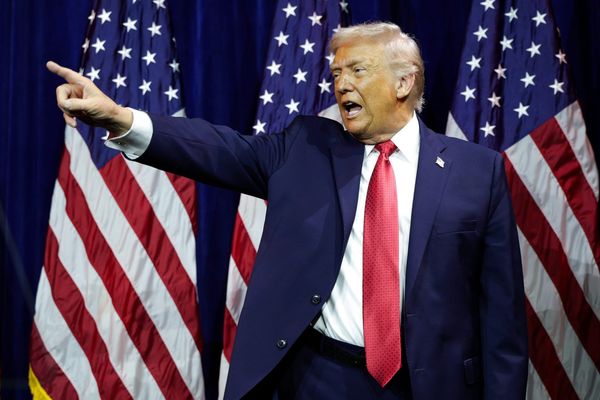
It was a beautiful Saturday afternoon, on 24 June 1995, when New Zealand and South Africa walked down the Ellis Park tunnel and out into the magical light of a winter’s day in Johannesburg. Fifteen men were dressed all in black and 15 men wore green, gold and white. They obviously had no idea then that 28 years would have to pass before these two giants could face each other again when it matters most – in a World Cup final.
This Saturday in Paris, the All Black and Springbok squads will emerge from the tunnel at the Stade de France with the knowledge that the two countries they represent have each won the World Cup three times. By the time the next tournament begins, in 2027, the World Cup will have been in the possession of either New Zealand or South Africa for 24 successive years.
The 1995 final, however, went beyond sport. It felt historic. A World Cup final in the new South Africa, in the South Africa of a free Nelson Mandela, felt like a fresh beginning. It felt like the end of apartheid in the last area to surrender – rugby.
President Mandela, demonised for so long as a terrorist, followed the players on to the pitch. Unlike a career politician, Mandela had dressed for the occasion. He wore a Springbok shirt with the No 6 on his back. It was the shirt Francois Pienaar, South Africa’s Afrikaans captain, had sent to him. A smiling Mandela, who was 76, doffed his Springbok cap.
I am a South African. I was born into apartheid and grew up in a country which had jailed Mandela for 27 years. And so it felt profoundly moving to then hear the chant that gathered in booming intensity: “Nelson … Nelson … Nelson …”
Sean Fitzpatrick, the New Zealand captain, led him down the line of All Blacks. When he reached Jonah Lomu, Mandela stopped. He looked up at the 6ft 5in Lomu, who packed 18 stone of muscle and thunderous power on the wing, and said: “You! You are the one!” Lomu nodded shyly. Having just turned 20, he had obliterated every team he had faced in the World Cup and become rugby’s first genuine international celebrity with a fame so sudden and so shocking it spread from South Africa to countries which had never played rugby.
Mandela was enjoying himself enormously and, as he lingered, Lomu flexed the muscles in his neck. You could tell that big Jonah was impatient for his first big hit and run in the sun.
I became friends with James Small, the Springbok wing who marked Lomu that day. Small loved boxing and the crime novels of Edward Bunker. In 1997 he told me: “Before the final it was eerie. On the bus to the ground I had my little Walkman on. I was listening to Hymn of the Big Wheel by Massive Attack. It’s a beautiful song, with a slow and hypnotic beat, and a high voice [belonging to the great Jamaican singer Horace Andy] sings this line over and over: “And the big wheel keeps on turning …”
“I could see people walking to the ground, carrying the new flag and banners telling Lomu he had ‘A Small Problem’. Time seemed to slow and I got goosebumps. Just before the game Chester Williams [South Africa’s only player of colour] said: ‘You hold him James, and the rest of us will pull him down.’”

On the pitch, Mandela stopped in front of Small. He offered a curious smile, as sweet as it was grave. “And then,” Small told me, “Mandela laughed. He was thinking: ‘Shame! This poor guy is marking Lomu.’ Mandela took my hand and said: ‘You’ve got a big job today, Mr Small.’”
The game was rarely scintillating. Yet it was impossible to look away. It held us in a grip so tight there were times you had to tell yourself to breathe. Lomu could not break through. He kept being hit by one green wave after another.
“Lomu is down!” the commentators screamed as if Muhammad Ali himself had finally fallen. “Lomu is down!”
The game was tryless and at full time the old foes were shackled together, 9-9. Before extra time began the mostly white crowd joined a black choir singing on the edge of the pitch. A black workers’ song, Shosholoza, became a South African rugby hymn.
Pienaar and the Springboks rose to their feet, the captain in the middle of a circle as he urged his players to lift themselves for another 20 minutes. And, still, Shosholoza rang out as if one song and one game of rugby could change everything.
After swapping penalties the exhausted teams still seemed inseparable, 12-12. But there was one crucial difference. If the score remained unchanged New Zealand would win the World Cup as they had a better disciplinary record.
Then, just before the very end, Joost van der Westhuizen passed to Joel Stransky. The All Blacks closed him down but Stransky went for the drop goal. The ball began its spiralling climb. We rose with it. We were in the air as the ball passed through the highest points of the poles.

“It’s over,” a broken voice cried out. “It’s over.”
Finally, it really was over, 15-12 to South Africa. Pienaar was on his haunches, fingers squeezing his nose as if he might push back the tears.
Mandela, the country’s inspirational mentor and great moderator, spoke to Pienaar just before he presented the trophy. “Thank you for what you have done for South Africa,” Mandela said. Pienaar looked at his elderly president. “We could never do what you have done for South Africa,” he replied.
Then, Pienaar lifted the World Cup. His eyes closed and his arms straightened. Mandela shook his own arms in delight.
The Springbok captain was asked about the “tremendous” backing his team had received from 65,000 supporters. Pienaar shook his head: “We had 43 million South Africans today.”
Now, 28 years later, New Zealand and South Africa are locked together again as their rivalry resumes. Mandela is dead, as are Lomu and Small. Other Springboks from that momentous final – Van der Westhuizen, Williams and Ruben Kruger – have also died.
The world feels very different. In some ways it feels a far worse and more dangerous place. But South Africa, the reigning world champions, have an inspirational black captain in Siya Kolisi and a side that truly represents every corner of that vast and complex country. The All Blacks retain their majestic aura. And so, in Paris, South Africa and New Zealand meet again, as the big wheel keeps on turning.







